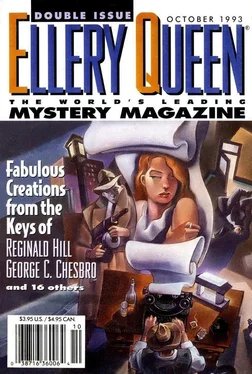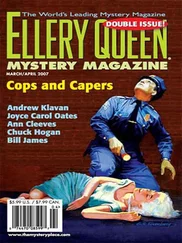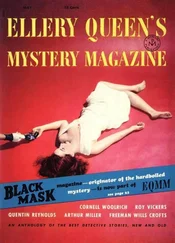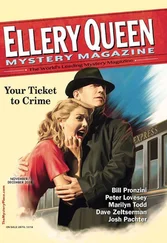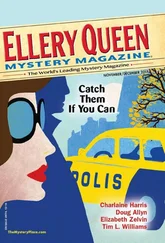Charles Ardai - Ellery Queen’s Mystery Magazine. Vol. 102, No. 4 & 5. Whole No. 618 & 619, October 1993
Здесь есть возможность читать онлайн «Charles Ardai - Ellery Queen’s Mystery Magazine. Vol. 102, No. 4 & 5. Whole No. 618 & 619, October 1993» весь текст электронной книги совершенно бесплатно (целиком полную версию без сокращений). В некоторых случаях можно слушать аудио, скачать через торрент в формате fb2 и присутствует краткое содержание. Город: New York, Год выпуска: 1993, Издательство: Davis Publications, Жанр: Детектив, на английском языке. Описание произведения, (предисловие) а так же отзывы посетителей доступны на портале библиотеки ЛибКат.
- Название:Ellery Queen’s Mystery Magazine. Vol. 102, No. 4 & 5. Whole No. 618 & 619, October 1993
- Автор:
- Издательство:Davis Publications
- Жанр:
- Год:1993
- Город:New York
- ISBN:нет данных
- Рейтинг книги:3 / 5. Голосов: 1
-
Избранное:Добавить в избранное
- Отзывы:
-
Ваша оценка:
- 60
- 1
- 2
- 3
- 4
- 5
Ellery Queen’s Mystery Magazine. Vol. 102, No. 4 & 5. Whole No. 618 & 619, October 1993: краткое содержание, описание и аннотация
Предлагаем к чтению аннотацию, описание, краткое содержание или предисловие (зависит от того, что написал сам автор книги «Ellery Queen’s Mystery Magazine. Vol. 102, No. 4 & 5. Whole No. 618 & 619, October 1993»). Если вы не нашли необходимую информацию о книге — напишите в комментариях, мы постараемся отыскать её.
Ellery Queen’s Mystery Magazine. Vol. 102, No. 4 & 5. Whole No. 618 & 619, October 1993 — читать онлайн бесплатно полную книгу (весь текст) целиком
Ниже представлен текст книги, разбитый по страницам. Система сохранения места последней прочитанной страницы, позволяет с удобством читать онлайн бесплатно книгу «Ellery Queen’s Mystery Magazine. Vol. 102, No. 4 & 5. Whole No. 618 & 619, October 1993», без необходимости каждый раз заново искать на чём Вы остановились. Поставьте закладку, и сможете в любой момент перейти на страницу, на которой закончили чтение.
Интервал:
Закладка:
With the money had come a note: “10 %, October 1.”
Ramon hid the money in a cabinet in the cellar and rationed it carefully, day by day, buying only what he needed, paying off his bills one at a time. To Lienore he explained by saying that business was improving — which, in fact, by small degrees it was. Suppliers agreed to supply him again now that his debts were erased. Borges resumed making legitimate stops, restocking Ramon’s shelves with snack cakes and soft drinks. Sales remained slow, but Ramon had the money to fall back on. The store survived through the worst of it.
And as the heat of summer passed, as, at last, occasional storms came to invigorate the parched landscape, Ramon saw tourists return. When it rained in the middle of the day and tourists angrily ran to take shelter in his store, or his restaurant, or the cantina, Ramon was overjoyed. The drought was ending; life was resuming.
When the first of October came, he found he had used only a little more than half of the original loan — he had, he discovered, overestimated his need. He had also collected enough to pay the interest, which was more than half again as much as the original amount. It galled him to think that he could have asked for less and thereby paid less in interest, but the past was the past. For now he was only concerned to get over the need to repay the loan.
He returned, on the morning of the first, to the house where he had met the Jomon before, carrying his precious parcel under his arm. He placed it on the table with a great sense of relief and accomplishment, feeling as though he were completing a legitimate business transaction. Ramon was not ashamed of what he had done.
But the three men then counted the money, insisting that Ramon remain while they did so; and when they were finished they asked him a question that swept over him like a cold wind and made his soul curl up inside him.
“Where,” the blond asked in an easy and innocent tone, “is the rest of it?”
“The rest?” Ramon said.
“The rest. Ten percent weekly over a period of six months equals two hundred sixty percent. Plus the original amount, of course.” The blond then did some calculations on a pocket calculator and came up with a figure, which he showed Ramon.
“I am sorry, sir,” Ramon said, with all the calmness he could command, “but you said ten percent per month. Not per week.”
“Per month? Are you mad? You could practically get money from a bank at that rate.”
“But it is what you said,” Ramon whispered desperately.
“Is it? Show me.”
And Ramon pulled the note that had come with the money out of his pocket, suddenly aware that it said neither week nor month on it, and knowing in that instant that this had been a deliberate omission. They took the note from him, pretended to look at it, noted that it said only what it said, “10 %, October 1,” and nothing more. But, of course, they said, it was understood by all that interest was a weekly matter.
Ramon could not contain himself. He threw himself at the table, knocking over the stack of money he had collected so painstakingly over the course of half a year. “Here is your money,” he screamed. “It is what you asked for, to the cruzeiro. You know that as well as I do. I cannot pay you more. I cannot pay what you ask. I don’t have it. Take this — it is what we agreed on.” He turned to leave and made it almost to the door.
“Your family will not appreciate your attitude,” the blond said.
Ramon turned back and said, with great fear in his voice, “You will not touch my family.”
“Not if you pay,” the blond said.
“I cannot pay.”
“In cash, maybe not,” the blond said. “But I think we can make other arrangements. Your restaurant has been prosperous, I believe; and you own a piece of El Cantoria. Sign these over to us and we will consider the debt canceled.”
So this was the point of the double cross, Ramon thought, to steal from him all he had spent his life to earn. “I will not give you that. And you will not touch my family,” he said. “I have paid. Our dealings are through.” Then he turned and left, on legs so unstable that he had to sit for twenty minutes in his Jeep before he felt he could drive home safely.
That they would try to squeeze extra money out of him Ramon might have imagined — but on this scale! He could not comprehend it. Did they really think that a poor man, even one with successful businesses, could pay almost three hundred percent interest? Then to request that he relinquish his businesses to them! Had they really expected him to give in?
He drove home in a rage, ready to pack Lienore and Maria up and take them away: out of the country, into the United States, anywhere. He would not be a slave to a gang of sharks, nor would he live in fear for his life. They would go away, even this very night if necessary. They would start fresh and make none of the same mistakes again. He prepared his explanation to Lienore as he walked through the bodega to the stairs in back that led up to their apartment.
But when he got there, he found Lienore lying dead against the stairs, her arms flung up over her head, blood still draining from the wound in her neck.
Ramon ran to her, knelt next to her, cradled her corpse in his arms. Her blood ran onto his hands and down his neck. He started to howl like a baby. One of the men who worked in the steakhouse heard his cries and found him, holding Lienore tightly to his chest. The man left and returned a few moments later with a policeman.
The police decided that Lienore had been the victim of a burglar. And when, later that day, they found Maria’s body in a changing booth at the beach, they dismissed it as the work of a sex criminal. These were the kind of random tragedies that happened every day; that it had happened to two members of the same family in a single day seemed to the disinterested police merely an odd twist of fate. They offered Ramon their condolences, but not their protection or their further assistance.
Ramon numbly accepted all they told him and said not a word about the Jomon. He barely heard the policemen’s explanations or his own account, which he repeated three times, of how he had found his wife’s body. His mind was filled with the picture of his wife’s blood pouring onto his palms and running between his fingers, of his daughter’s bruised throat and lifeless eyes, and of the Jomon’s threat that they would kill him, too, should he fail to cooperate. His ears burned with the words of his daughter’s friends, who had told him (but not the police) that they had seen Maria last in the company of a long-haired blond who had asked them, before leading Maria away, to give his regards to her father.
Ramon ran, first thing the next morning, to his safety-deposit box in the bank. He took the papers of ownership for the steakhouse and the cantina to the house of the Jomon and begged to be let in. Then, with tears streaming down his face, he handed the papers over into the hands that had murdered his daughter, felt those hands clasp his and clap his back and then push him once more out into the street, where he lay down in the dark mouth of an alley and wept.
The door closed behind the Jomon; the noises from outside grew quiet once more. The man in the mask picked up the telephone on the desk.
He dialed the police.
“Tonight, at eight-thirty, a man will be killed on Pescador Street by the Jomon. I suggest you have men on hand to apprehend them.”
Then, as the tiny voice started squeaking questions at him through the earpiece, the man in the mask hung up.
The police, in masks of gold brocade and beaded ponchos and feather headdresses, filter onto the street and mix with the crowd. It is not yet eight o’clock and the sun has just set.
Читать дальшеИнтервал:
Закладка:
Похожие книги на «Ellery Queen’s Mystery Magazine. Vol. 102, No. 4 & 5. Whole No. 618 & 619, October 1993»
Представляем Вашему вниманию похожие книги на «Ellery Queen’s Mystery Magazine. Vol. 102, No. 4 & 5. Whole No. 618 & 619, October 1993» списком для выбора. Мы отобрали схожую по названию и смыслу литературу в надежде предоставить читателям больше вариантов отыскать новые, интересные, ещё непрочитанные произведения.
Обсуждение, отзывы о книге «Ellery Queen’s Mystery Magazine. Vol. 102, No. 4 & 5. Whole No. 618 & 619, October 1993» и просто собственные мнения читателей. Оставьте ваши комментарии, напишите, что Вы думаете о произведении, его смысле или главных героях. Укажите что конкретно понравилось, а что нет, и почему Вы так считаете.
